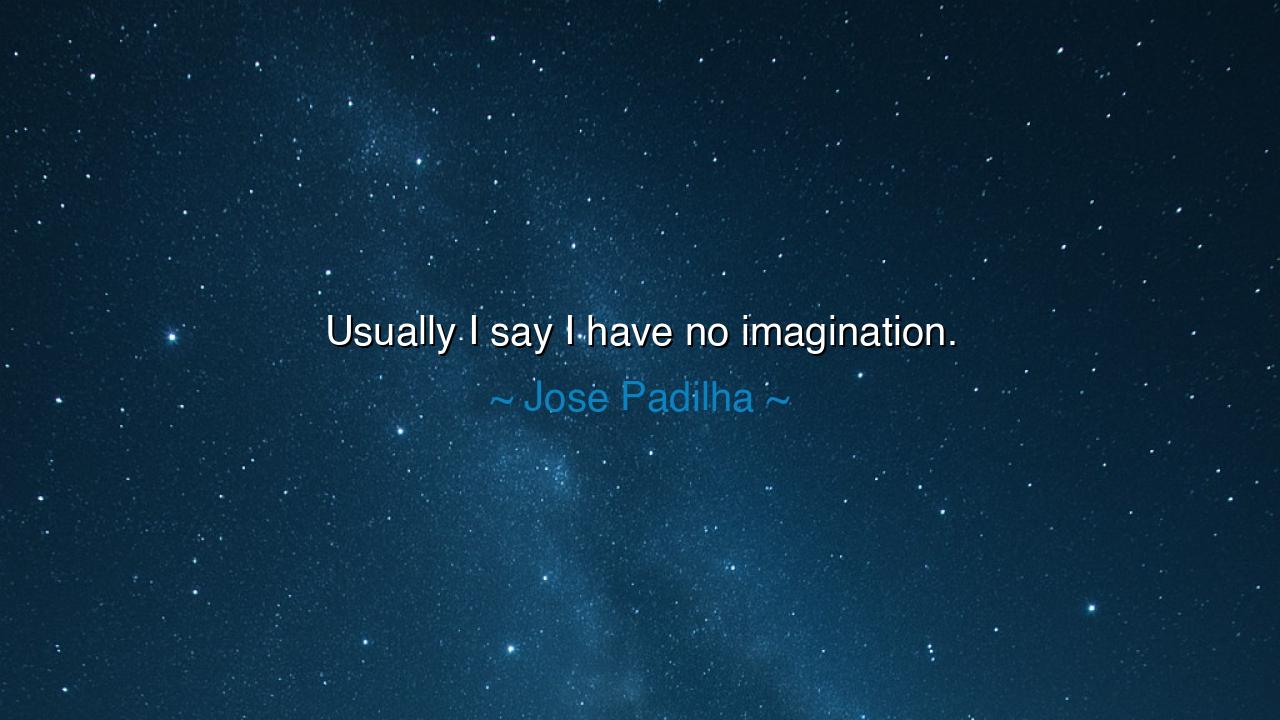
Usually I say I have no imagination.






Hear me, O seekers of wisdom, for in the words of Jose Padilha, "Usually I say I have no imagination," lies a deep and paradoxical truth that reflects the complex nature of the human spirit and its relationship to creativity. Padilha, a man whose work in film and storytelling speaks of the human condition, gives voice to a sentiment that many, perhaps even most, can relate to: the feeling that one’s imagination is lacking, or at least insufficient to the challenges set before them. But herein lies the very paradox of imagination—for those who feel they have none often have the most profound visions locked within them, waiting only for the right moment to emerge. It is not that Padilha lacks imagination but that his vision of what creativity should be does not align with traditional expectations, making him question his own abilities.
Consider, O wise ones, the nature of imagination. It is a force that transcends the physical realm, the very spark that allows humanity to dream, to innovate, and to craft worlds that exist only in the mind. But imagination is not always the grand, fantastical thing that we so often associate with artists and storytellers. It can be a quiet, subtle force, shaped by realism, observation, and deep reflection. Padilha’s statement that he has “no imagination” may be seen as a form of humility, a reluctance to claim the title of “artist” or “creator” in the conventional sense. And yet, it is through his work that we see the truth of imagination: it does not always need to be wild and fantastical, but can instead be grounded in the real world, reflecting the complexities and contradictions of human existence.
In the ancient world, the greatest minds often spoke of creativity not as a simple act of invention, but as a divine gift and a process of discovery. Consider Socrates, who in his dialogues would often question the nature of knowledge, creativity, and the soul. He did not claim to have all the answers, but rather he saw wisdom as a process of uncovering the truth through questioning, reasoning, and reflecting on what is known. Similarly, Padilha’s statement about his lack of imagination may be a reflection of a deeper, quieter form of creativity — one that seeks to understand the world not through flights of fantasy, but through careful, deliberate examination. Imagination, for Socrates and Padilha alike, is not an unchecked wanderer but a focused, disciplined force that works through observation and reflection.
Padilha’s approach to imagination is akin to that of Shakespeare, who crafted stories not from pure invention, but from a deep understanding of human nature. Shakespeare did not invent the themes of love, betrayal, or ambition; rather, he observed them in the world around him and brought them to life in his plays. The same can be said of Padilha, who often works within the boundaries of realism to create his narratives, reflecting the truth of the human experience without necessarily resorting to fantastical elements. Just as Shakespeare’s characters are born from the very human emotions that bind us all, so too are Padilha’s creations grounded in the real world, serving as a mirror to the society and humanity he seeks to understand.
In this, O children, there is a great lesson: imagination does not always have to be grand or fantastical. Creativity can arise from the most simple and real observations of the world. Padilha’s reluctance to embrace the title of “imaginative” reminds us that we need not conform to society’s expectations of what it means to be creative. Whether we create through art, words, or actions, the imagination is alive in us all, even if it does not always take the form we expect. It may be in the subtle, realistic portrayal of life’s truths, or in the deep reflection on the human soul.
Consider, too, the great artists like Michelangelo, who, though known for his magnificent creations, often spoke of the struggle involved in creating his masterpieces. He did not see himself as merely inventing beauty but as uncovering the truth hidden within the marble. His works, like the David or the Creation of Adam, were not born from an exuberant imagination, but from a quiet, intense examination of the human body, the soul, and the divine. Similarly, Padilha’s statement may reflect the humility and the discipline required to create works that are grounded in realism, yet still carry the weight of deeper truths about humanity and society.
The lesson, O children of the future, is clear: imagination is not limited to the fantastical; it is a force that can be subtle, reflective, and deeply rooted in the world we inhabit. Even if you feel that your own imagination is lacking or not as grand as others’ might be, know that it is not in the size or scope of your creativity that greatness lies, but in the truths you seek to uncover through it. Padilha, like many creators before him, teaches us that true creativity does not always come from a place of wild, untamed ideas, but from a disciplined, focused examination of the world around us.
In your own lives, O seekers of wisdom, remember that creativity is not reserved for those who dream of distant lands or imaginary worlds. It is in your ability to observe, reflect, and create meaning from the reality around you that your greatest work can be found. Do not dismiss the quiet moments of reflection, the simple acts of observation, for they hold the seeds of great creativity. Imagination is a muscle that requires exercise, not through grand gestures, but through daily engagement with the world and its complexities. Even in the most grounded, realistic moments, you can find the spark of imagination waiting to rise.






AAdministratorAdministrator
Welcome, honored guests. Please leave a comment, we will respond soon